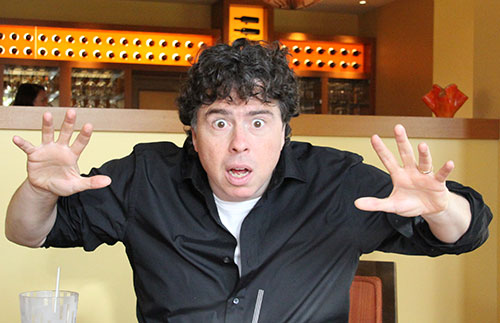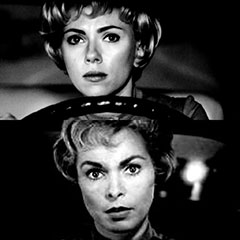Interview: Sacha Gervasi, 'Hitchcock'
 I recently had the pleasure of interviewing director Sacha Gervasi, who was in Austin promoting his new film Hitchcock, based on Stephen Rebello's book Alfred Hitchcock and the Making of Psycho. The movie provides an intimate look behind the scenes of Psycho, where the greatest influence was not from a Hollywood blonde but the formidable woman in Hitchcock's life -- his wife, Alma Reville. The film opens in Austin on Friday.
I recently had the pleasure of interviewing director Sacha Gervasi, who was in Austin promoting his new film Hitchcock, based on Stephen Rebello's book Alfred Hitchcock and the Making of Psycho. The movie provides an intimate look behind the scenes of Psycho, where the greatest influence was not from a Hollywood blonde but the formidable woman in Hitchcock's life -- his wife, Alma Reville. The film opens in Austin on Friday.
Gervasi -- seen above at a post-interview lunch -- chatted with me about Hitchcock's influences and the challenges he faced during the making of Psycho, as well as Gervasi's own method of portraying such an iconic subject.
Slackerwood: Your film Hitchcock demonstrates an intimacy that audiences normally wouldn't associate with Alfred Hitchcock.
Sacha Gervasi: I think it's interesting for audiences seeing his films -- clearly we are very intimate with his psychological neuroses, but we aren't necessarily intimate with the man himself. My perspective on it was that over the years, Hitchcock has been maligned at times. He's been painted as either a creative genius on one level, or some sort of monster who is unspeakably cruel to his actors and actresses. I think that's probably true at different times and we have that in our film.
 There's real darkness you see as he directs Scarlett Johansson as Janet Leigh driving (seen right) -- he's incredibly mean and tough with her. He argues with his wife Helen Mirren as Alma Reville, and he's very tough with her. Then you see him during the shower scene, and he's completely unleashed like he's mad. What we wanted to do was add to the vast debate on Hitchcock, to just say, "Look -- there's another side to him, that intimate tender human side."
There's real darkness you see as he directs Scarlett Johansson as Janet Leigh driving (seen right) -- he's incredibly mean and tough with her. He argues with his wife Helen Mirren as Alma Reville, and he's very tough with her. Then you see him during the shower scene, and he's completely unleashed like he's mad. What we wanted to do was add to the vast debate on Hitchcock, to just say, "Look -- there's another side to him, that intimate tender human side."
The big validation for me is having people that actually worked with Hitchcock come up to me very recently at screenings. They said, "The humor, mischief and spirit of the man that I worked with has not been captured in a lot of these biographies and the way that he's been portrayed. Your film for the first time shows the man that I worked with on a daily basis."
We are certainly not trying to whitewash his dark side -- quite the opposite. He's dialoguing with a serial killer, it's really intense stuff. But we are also saying that he was with this woman [Reville] for 36 years -- she stood by his side and made a massive contribution to his work. In the case of Psycho alone, it was Alma who insisted that Bernard Hermann's music be in that scene. She was the one saying, "You have to put the music in there." He said, "No, it's a montage -- just the sound of running water" and they had a massive argument. It was only because he deferred to her, it was her taste and her opinion that was the only one that he trusted. He didn't listen to anyone else, so when Alma really fought for something, he knew that she might be right so he went with her.
When you think about the greatest scenes in the history of America cinema -- let alone Hitchcock -- you think about that shower scene and that music. Alma had a major if not definitive role in ensuring that music was in that scene. Just for that alone, I felt it was worth shining a light on this relationship and collaboration, and also this woman that frankly most people just don't know anything about.
Watch bonus Fox Searchlight featurette "Hitch and Alma" below for more insight from Gervasi, Mirren, and Hopkins on their relationship:
Hitchcock focuses heavily on gender-influenced neuroses in his films while also surrounding himself in his real life with strong women, including his loyal assistant Peggy Robertson, at a time in Hollywood when women weren't visibly in power. How were you able to portray that?
Gervasi: Clearly Hitchcock's relationship to women goes back to his mother. His incredibly strict Edwardian upbringing in the south of London, the son of a greengrocer and a poulterer from working class backgrounds -- he was a regular person. Alfred Hitchcock was not an English snob, he just played one on television. He was a real working-class guy who just happened to be brilliant.
Clearly his feelings for women were quite repressed -- you see it in the films. He's clearly fantasizing about sex and death and murder. I think that women were scary to him, they were figures of fantasy -- these beautiful women that in real life he never would have been able to touch. He was able to find a way to have power over them, but at the same time in his real life he admired the strength of women such as Peggy and Alma. I think that it is because of his bizarre and unique relationship to women that the audience is stimulated by his weird psychological neuroses because he is clearly a voyeur and fetishistic. He's in awe of women, and he's scared of them, which is a wonderful aspect to his character.
Slackerwood: How do you overcome the star power of Anthony Hopkins portraying Alfred Hitchcock?
Gervasi: Quite the opposite -- Hitchcock made movies for the audience, he had a tremendous sense of humor about him. He was very droll and ironic, and tongue-in-cheek. We actually had a prosthetic that covered Tony and made him look exactly like Alfred Hitchcock. The problem was that it covered Tony and so you couldn't see anything. You have to be able to see the actor. We weren't trying to impersonate Hitchcock, we were trying to let them know that here is one of our greatest actors of all time portraying this iconic character in this tradition of the other iconic characters like Nixon, C.S. Lewis in Shadowlands, Picasso, Hitler -- that Hopkins has played over the course of his career. The last thing we wanted to do was hide him, I want you to know that it is Anthony Hopkins playing this role because he is channeling Hitchcock.
Which Hitchcock film has most influenced you?
Gervasi: Rear Window -- how can you not love Rear Window? As things progressed, I came to Vertigo as my favorite film, ironically referred to in the film as being a commercial and critical failure. What was ironic was that on the day that we shot the scene where he wakes up from a nightmare, and he says, "What if it's another Vertigo?" that day it was voted the #1 film of all time by Sight and Sound. It just makes you realize how one's perception of a film at a particular point in time can change.
Slackerwood: In its own way, Hitchcock strikes me as being an underdog story.
Gervasi: That's the fun and ironic part of this film. Alfred Hitchcock -- what kind of an underdog is he? Yet he's at the top of his game in 1959, North by Northwest is a massive hit, and no one wants to make Psycho so he risks his own money. You take the king, and you turn him into an underdog. That was part of the fun of the movie, is that still at 60 years old with all his success he still had to prove to the system and to himself that he was the "real deal." He had all these young filmmakers coming up, out of France and the new generation of filmmakers.
Hitchcock was feeling like he needed to re-invent himself, and that's what is wonderful about this -- a guy who was not satisfied with the tomb of success, with being asked to repeat things over and over again. He wanted to re-invigorate his career and shock audiences. He also wanted to wake himself up from the notion that he would have to just repeat himself with these pretty movies set on the Riviera with pretty movies stars. He'd done it, and any real artist realizes that they can't just do the same thing over and over again. There's something powerful about that, and I love that story.
But it's really a relationship story of a marriage 36 years in. What I loved about John McLaughlin's screenplay is that it speaks to how hard marriage can be to sustain over the long haul. It's bloody hard -- the stresses, the pressures, the intensity -- but at the same time the joy of knowing that you have someone incredible by your side who is absolutely willing to live through all your madness, self-obsession and craziness, and can still love you. At that level it's a love story, but a real one.
I hope audiences can come to it open, with excitement about seeing the making of Psycho stuff, but also a sense of this is an emotional story about Hitchcock, in the sense that we don't want to stereotype him. We just want people to recognize his flawed humanity, which I think we can all recognize in ourselves. It was the universality of that, that really surprised me when I read John's script.
It's about acknowledging unacknowledged partners, it's about an artist willing to risk everything to feel young, alive and relevant again, and it's about marriage. It's about all these things, as well as Alfred Hitchcock making Psycho.
Watch the Fox Searchlight featurette "Why This One, Hitch?" for a sneak peek on Hitchcock's determination to make Psycho.

